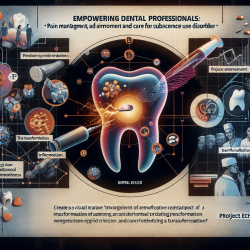Introduction
The opioid crisis continues to pose a significant public health challenge, with dentists playing a crucial role in addressing this epidemic. The research article "Launching an innovative educational model addressing substance use disorders and dental pain management (Project ECHO® in dentistry)" highlights a transformative approach to enhancing dental professionals' skills in managing pain and substance use disorders. This blog explores how practitioners can leverage the findings from this study to improve their clinical practices and outcomes for patients.
Understanding the Project ECHO Model
Project ECHO (Extension for Community Healthcare Outcomes) is an innovative educational model that utilizes telementoring to connect healthcare providers with experts in various fields. The "Pain Management and Substance Use Disorders Dental ECHO" program, as discussed in the study, aims to equip dental professionals with the necessary knowledge and skills to manage dental pain effectively while addressing substance use disorders.
Key Outcomes of the Research
The study revealed significant improvements in participants' knowledge and confidence in managing dental pain and substance use disorders. Key outcomes included:
- Increased knowledge of medications used in treating substance use disorders, such as buprenorphine and naloxone.
- Enhanced confidence in identifying patients with substance use disorders and discussing alternative pain management strategies.
- Improved compliance with Prescription Drug Monitoring Program (PDMP) checks before prescribing opioids.
- Positive changes in clinic policies regarding safe opioid prescribing and harm reduction practices.
Implementing the Research Findings
Dental practitioners can implement the outcomes of this research to improve their clinical practices in several ways:
- Participate in Project ECHO Programs: Engage in telementoring sessions to gain insights from interdisciplinary experts and enhance your knowledge and skills in managing dental pain and substance use disorders.
- Utilize Evidence-Based Practices: Incorporate evidence-based pain management strategies, such as non-opioid alternatives, into your practice to reduce reliance on opioids.
- Enhance Patient Communication: Develop effective communication strategies to discuss pain management options and substance use disorders with patients, fostering trust and collaboration.
- Promote Safe Prescribing Practices: Regularly check the PDMP and adhere to guidelines for safe opioid prescribing to minimize the risk of misuse and diversion.
- Advocate for Policy Changes: Work within your clinic to implement policies that support harm reduction and safe prescribing practices, ensuring a comprehensive approach to patient care.
Encouraging Further Research
While the findings of this study are promising, there is a need for continued research to explore the long-term impact of Project ECHO programs on clinical outcomes and patient care. Practitioners are encouraged to engage in research initiatives and contribute to the growing body of evidence supporting innovative educational models in healthcare.
Conclusion
The "Pain Management and Substance Use Disorders Dental ECHO" program demonstrates the potential of innovative educational models to enhance dental professionals' capabilities in managing pain and substance use disorders. By implementing the research findings, practitioners can improve patient outcomes, reduce opioid misuse, and contribute to addressing the opioid crisis effectively.
To read the original research paper, please follow this link: Launching an innovative educational model addressing substance use disorders and dental pain management (Project ECHO® in dentistry).










